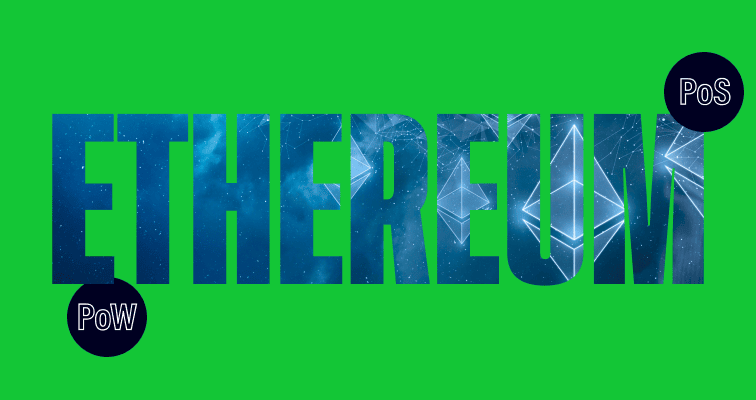Ethereum is an open-source software platform that developers can use to create cryptos and other digital applications (dApps). Ethereum’s use of blockchain technology guarantees that all operations are secure and transparent.
Do you know a little about Ethereum but want to learn more? With our beginner’s guide to Ethereum, you can gain valuable knowledge as you consider making your first purchase of one of the world’s top cryptocurrencies.
What is Ethereum?
Ethereum is an open-source software platform. Developers can use it to create cryptocurrencies and other digital applications (dApps). Ethereum is also the name used to describe the cryptocurrency Ether (ETH), which is the native coin of the Ethereum blockchain.
Ethereum’s purpose extends beyond financial transactions. It provides a platform for developers to create applications that run without any possibility of downtime, fraud or interference from third parties. This is achieved through its unique use of blockchain technology, which ensures that all operations are transparent and secure.
As a result, Ethereum has become a popular choice for projects that require a high level of trust and decentralization.
Tip: Test networks such as Ropsten and Goerli allow you to experiment with dApps without risking real funds.
History of Ethereum
Ethereum was created, at least in part, as a response to the shortcomings of Bitcoin. The whitepaper was published in 2013 by Vitalik Buterin, one of Ethereum’s co-founders. In 2014, ether was put on sale, with interested parties able to purchase the cryptocurrency with bitcoin.
A series of planned changes to the Ethereum network are outlined in the Ethereum Roadmap which gives users notice of upgrades which are implemented in distinct phases. In July 2015, a scaled-down version of the Ethereum project went live, with developers and miners encouraged to start operating on the network. Any limits were lifted later that year and a default gas fee was introduced.
Since its inception, Ethereum has experienced several forks. These changes provide some benefit to the network, sometimes as a response to malicious attacks. For example, in 2017, the Byzantium Fork reduced block mining rewards and added additional methods of cryptography to allow for additional scalability.
Tip: Ethereum Classic is a completely separate cryptocurrency and blockchain to its Ethereum counterpart.
Perhaps the biggest change in Ethereum’s short history occurred as a result of “The Merge” which is also known as Ethereum 2.0. These were a set of substantial upgrades introduced in 2022 designed to increase the network’s usability, efficiency, and scalability.
What is Blockchain Technology?
Blockchain technology is a method of using cryptographic fundamentals to link (or chain) together blocks of digital records kept on a group of computers. Each computer contains a complete record of all transactions. Therefore, the system won’t collapse if one computer fails.

Blockchain systems typically have thousands of computers involved, but there is no governing authority controlling the network, making a blockchain network a decentralized system. Transparent recordkeeping is key to getting people to trust the system, so the network’s records are open to the public.
Blockchain technology uses cryptographic principles to prevent the records from being forged or altered. Each new transaction undergoes an in-depth mathematical verification process. In theory, anyone hoping to maliciously alter a record would have to change every occurrence of that record on every computer in the world participating on that network.
What is a Smart Contract?
A smart contract is computer code that establishes the guidelines of a contract and then makes sure that the parties involved execute the contract according to those terms. Smart contracts aren’t necessarily legal in nature; more simply, they are lines of code that execute a function.
Ethereum’s blockchain technology and smart contracts allow two parties to initiate and carry out a smart contract between them without the use of a traditional intermediary third party. Smart contracts are transparent and unchangeable, making it impossible for one party to later alter the terms of the contract in their favor.
Tip: The Ethereum platform allows outside developers to create their own blockchain applications and even new cryptocurrencies.
What Are the Uses of Ethereum?
Ethereum is a platform for decentralized applications, offering a wide range of possibilities for developers and businesses alike. Here are a few of the ways that people and organizations are using Ethereum (and the different cryptos created on its blockchain) today.

Crowdfunding
One use of Ethereum is raising startup capital for new businesses. Companies create new digital currencies known as tokens that they can offer on the Ethereum network. Speculators are often willing to take a chance on a new currency by purchasing the new token at its ICO (initial coin offering).
Social networks
Cent is a social network that makes it easy for fans to financially support their favorite content creators with crypto.
Lending systems
In the US, the three major agencies responsible for keeping a record of your credit history are Experian, Equifax and TransUnion. These bureaus handle such massive amounts of data that errors are common, and removing those errors can be difficult.
Your credit rating may then suffer and you could be denied loans or offered loans with unfavorable interest rates.
Decentralized lenders aren’t reliant on the credit reports produced by large third parties. Instead, your crypto serves as your collateral. Not only is it easier to receive a loan, but also the repayment terms are more flexible than those of a traditional loan.
Identity systems
Not everyone likes the idea of media giants such as Facebook storing our personal data. Some developers are working on ways to house this data on the blockchain to keep it safer than it could ever be in the hands of for-profit corporations.
This way, you could choose when to reveal information about yourself to another party (e.g., applying for a school or job). Once the application process is over, you could once again shield your data.
Tip: One way to keep your Ethereum accessible and secure is to hold it on the eToro Money crypto wallet.
Ethereum Criticisms
Few new systems avoid obstacles, and Ethereum is no exception. Potential investors should ask whether Ethereum’s challenges are existential or resolvable.
Fraud
Smart contracts function only as well as their underlying computer code, and they do not possess any form of artificial intelligence. If the creator makes an error, the smart contract will still follow its instructions, potentially leading to glitches or even security issues.
Smart contract compatibility
The fact that independent developers can create their own smart contracts and issue their own tokens is one of the trademark features of Ethereum, but there are also downsides.
The Ethereum blockchain was initially forced to communicate with each token differently, but developed community standards for new tokens called ERC-20 . However, not all developers choose to follow the standards. Depending upon which ERC-20 functions the developers ignore, other smart contracts may find it difficult to interact with their token.
Ethereum vs Bitcoin
While both Ethereum and Bitcoin are based on blockchain technology, they serve different purposes and have distinct features.

Bitcoin was created as a digital currency, designed to facilitate transactions without the need for intermediaries. Its primary focus is on providing a secure and decentralized means of transferring value.
Ethereum, on the other hand, was designed to be a platform for decentralized applications. Its blockchain supports smart contracts and dApps, allowing developers to create a wide range of applications beyond just financial transactions. This flexibility has made Ethereum a popular choice for projects that require a high level of trust and decentralization.
| Features | Ethereum | Bitcoin |
|---|---|---|
| Released | 2015 | 2009 |
| Primary creator | Vitalik Buterin and Gavin Wood | Satoshi Nakamoto (true identity unknown) |
| Purpose | Decentralized platform for developers | Digital monetary system |
| Market cap rank | 2nd | 1st |
| Currency | ether | bitcoin |
| Coin limit | None | 21 million |
| Relative transaction speed | Fast | Slow |
| Home to other currencies | Yes | No |
| Decentralized network | Yes | Yes |
| Value linked to fiat currency | No | No |
Final thoughts
Although it was Bitcoin that laid the foundations for the move away from fiat currencies, Ethereum has signalled ways to utilise the functionality of blockchain technology.
Its unique use of smart contracts and decentralized applications has opened up new possibilities for developers and businesses, making it a key player in the world of blockchain technology.
Learn more about Ethereum by joining the eToro Academy.
FAQs
- How does a smart contract differ from other contracts and protocols?
-
Traditional business software, which is responsible for executing particular actions, generally operates within the confines of a specific company. On the other hand, smart contracts can involve any number of players located anywhere in the world, thanks to blockchain technology. However, the actual smart contract is not distributed throughout the network to all the computers, but is instead housed on the server of the smart contract’s creator.
- What are Ethereum forks?
-
A fork is the term used when there is an upgrade made to a crypto’s protocol. There are both soft forks and hard forks. Soft forks represent minor adjustments, while hard forks are large-scale changes. Soft forks generally go into effect with little fanfare, but hard forks are sometimes associated with controversy.
Ethereum’s first hard fork took place in 2016 and resulted in the Ethereum community splitting into two separate camps. Hardliners felt that the developers had violated the essence of what it means to have a decentralized network. The blockchain running the original protocol is now called Ethereum Classic. The blockchain with the hard-forked protocol retained the name Ethereum.
- Who founded Ethereum?
-
Ethereum was founded by a group of visionary individuals led by Vitalik Buterin. Buterin, a programmer and writer, was inspired by the limitations he saw in Bitcoin’s scripting language. He envisioned a platform that could do more than just facilitate transactions, one that could support a wide range of applications.
Buterin was joined by other key figures, including Gavin Wood, Joseph Lubin, Mihai Alisie, and Anthony Di Iorio, each contributing their expertise to the development of Ethereum. Together, they launched Ethereum in July 2015, with the aim of creating a decentralized platform that could support a wide range of applications.
This information is for educational purposes only and should not be taken as investment advice, personal recommendation, or an offer of, or solicitation to, buy or sell any financial instruments.
This material has been prepared without regard to any particular investment objectives or financial situation and has not been prepared in accordance with the legal and regulatory requirements to promote independent research. Not all of the financial instruments and services referred to are offered by eToro and any references to past performance of a financial instrument, index, or a packaged investment product are not, and should not be taken as, a reliable indicator of future results.
eToro makes no representation and assumes no liability as to the accuracy or completeness of the content of this guide. Make sure you understand the risks involved in trading before committing any capital. Never risk more than you are prepared to lose.


